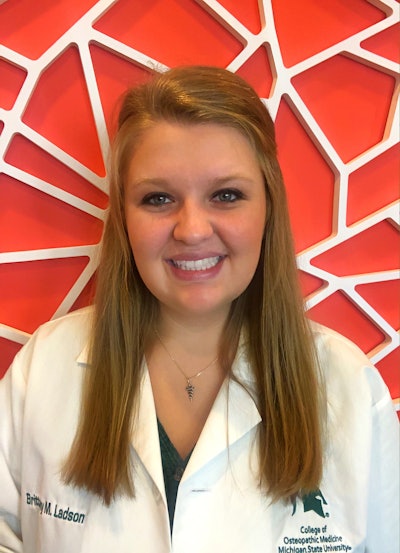 Brittany Ladson
Brittany Ladson“If you don’t post your COVID vaccine on social media, do you even form antibodies?” was my comical Instagram caption I posted after I received my first dose of the Pfizer vaccine at Sparrow Hospital in Lansing, Michigan. As a current 3rd year medical student at Michigan State University College of Osteopathic Medicine, nothing elated me more than finally seeing a tangible piece of hope at the end of a very hard year of death, grief, and exhaustion. The anticipation of fellow healthcare providers in the vaccination line was greater than the joy a family experiences on Christmas morning. One by one, we filed into the hospital auditorium and one by one, we entered a new chapter of the coronavirus pandemic.
As much as I want to be optimistic about the release of the COVID vaccination, I still hold a lot of personal concern about the impact it will have on populations outside of the hospital. Healthcare professionals and scientists know that vaccines are safe, trustable, and have saved countless lives throughout history; however, those outside the scientific community taunt the vaccine’s fast development as reason enough to not receive it. Others believe the vaccine will cause you to develop COVID symptoms, and even crazier, some claim the government is putting trackers into our bodies. If people don’t receive the vaccine, why celebrate it being released?
Coming from a small, conservative hometown, I hear vaccine conspiracy theories regularly. Many people are ignorant to the scientific process or willfully turn a blind eye to science as a whole. Additionally, in these communities, people tend to live in thought bubbles with fellow like-minded people. Such tendencies perpetuate dangerous misinformation and makes it even more challenging for scientific thought to enter and prevail.
In these small town environments, healthcare professionals, scientists, and medical students have an obligation to step in when people won’t step up for themselves. Where scientific textbooks aren’t welcome, posts on social media typically are. Where scientists’ opinions aren’t welcome, those of family and friends can be. For these reasons, I believe healthcare professionals have an obligation to the public’s health to share their COVID vaccination experiences on social media. Seeing photos and videos of people they know receiving the vaccination can be the convincing evidence needed to push them from skepticism to trust. It’s not a polarizing politician telling them to do something, it is their neighbor.
Not all health care workers and scientists come from academic, progressive families or hometowns where science is readily available and accessed. By scientists and healthcare providers having social media connections with non-scientists, individuals are provided with Facebook or Instagram content with which they are more likely to engage with. It’s less likely that a non-scientist would reference a science textbook before consulting social media or the internet. The utility of diversity in medicine is exemplary in this very concept: the diversity in political, geographical, and experiential upbringings is a way to connect scientists to the lay population and make science more assessible to everyone.
Ultimately, health care professionals must act as liaisons of medicine and science. With every vaccination, we get closer to reaching herd immunity. Healthcare providers and scientists, please take a stand for healthcare. Take a stand for science. Influence your community’s health. Share your COVID vaccination experience.
Brittany Ladson is a a third year medical student at Michigan State University College of Osteopathic Medicine.


















